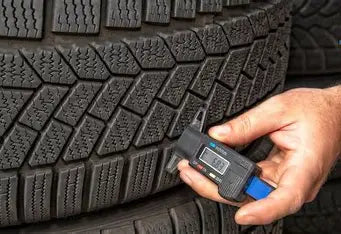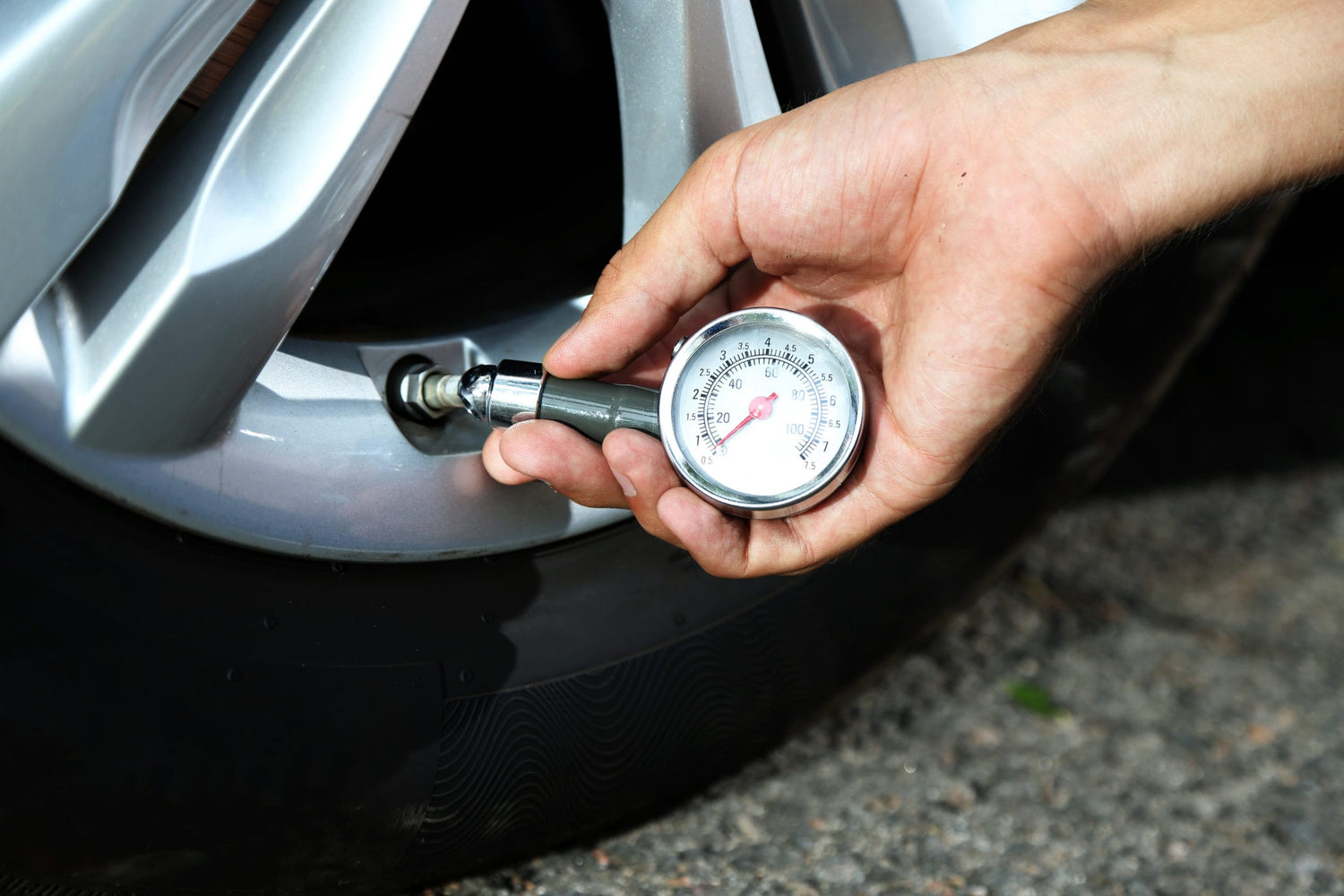
Wheel Safety Tips: Staying Safe on UK Roads
Your car's wheels are a critical component for safety, performance, and overall driving experience. Over time, wheels can suffer from wear and tear, exposure to road debris, and the general challenges of daily driving. In this guide, we'll dive into the essential aspects of car wheel maintenance, offering practical tips and advice to keep your wheels in top condition...
Wheel Maintenance
Keeping your wheels in good condition is essential for staying safe on the road. Wheel maintenance begins with the tyres.
There are two basic tyre maintenance checks that you should be doing weekly:
- Assessing the tread
- Checking your tyre pressure

Tyre treads have a direct impact not only on the performance of your vehicle but also on its overall safety, especially in poor weather conditions. The legal minimum tread depth is 1.6mm, so it is important to make sure that it does not go below this limit. If the tread is at or below the minimum depth, your tyres will need to be replaced straight away. Remember, driving a car with tyres below this limit is not only illegal but also extremely dangerous and will cause your vehicle to fail its MOT test.

Checking tyre pressure is essential for road safety, driver performance and fuel efficiency. If it is too high, you run the risk of excessive wear, poor vehicle handling and low suspension. However, if it is too low, you will likely experience punctures, poor fuel efficiency and increased rolling resistance. Either way it is dangerous.
Knowing how to check and inflate your tyres is critical to your day-to-day driving. You can use the gauge provided at a petrol station to check tyre pressures.
The recommended tyre pressure measurement for your vehicle is found in your vehicle's handbook, on the dashboard, or for newer vehicles, inside the fuel cap or on the driver's door.
Before you start, make sure the tyres are cold. If they are too warm, you may get inaccurate pressure readings.
It is also important to do a physical check of the tyres and look out for any signs of unusual wear or damage. This can include cuts, bulges or any objects that may have punctured the tyre. If you notice any of these problems, you will need to get them checked by a professional mechanic and repaired if necessary. In some cases, the tyre will need to be replaced altogether. If your vehicle has a spare tyre, check that one as well.
Regularly inspecting your wheel rims can help you catch any problems early and prevent further damage. Look for signs of corrosion, pitting or other damage, and address these issues as soon as possible to prevent them from worsening. You should also inspect your wheel rims for cracks, bends or other structural damage. If you notice any of these issues, it is important to have your wheels repaired or replaced immediately, as they can compromise the safety and performance of your vehicle.
Common Wheel Problems and Solutions
Wheel Alignment
Your wheels need to be correctly aligned as per the manufacturer's guidelines. Misaligned wheels are a common source of uneven tyre wear and also reduce the lifespan of the tyres and reduce fuel efficiency.
You can check your wheels' alignment by driving down a straight and quiet road, if you need to apply slight pressure on the steering wheel to keep your car going in a straight line, then your wheels need to be realigned.
Also, your steering wheel should be perfectly centred. One simple way to check your wheels' alignment is by looking at the emblem on your vehicle's steering wheel. If the emblem doesn't look level whilst driving down a straight road, this indicates that your steering wheel is not centred. When your vehicle has been realigned, the steering wheel will be centred, and you will have more control of your vehicle.
Wheel Balancing
If your steering wheel shakes mid-drive, especially at certain speeds or while turning, this is an indication that you need to get your wheels balanced. Wheel balancing, also called tyre balancing, ensures that the weight of a wheel and tyre assembly is distributed evenly for a safe and smooth ride. Wheel balancing is essential for vehicle safety as well as making the most of your tyre investment.
Wheel balancing and alignment are NOT the same things. They are two completely different processes.
Unbalanced tyres can be caused by:
- Flat spots, especially if you haven't driven the vehicle or moved it in a while.
- Hitting a curb, bump or pothole hard causing the lose of a wheel weight or further tyre and wheel damage.
- Colder weather because it can cause your tyre(s) to deflate.
- Your tyre has a puncture and needs repair or replacement.
Cracked or Bent Wheel Rims
Cracked wheel rims are a common problem. The most common cause of cracked rims is driving over potholes or other uneven surfaces. This can send a juddering force through your vehicle and crack the wheel rim. Sometimes, the damage may be fairly superficial and can be fixed with a simple weld. However, in other cases, the damage may be more serious and require the replacement of the entire wheel rim.
Bent wheel rims also occur when the impact of hitting a pothole or other object is too much for the wheel rim to bear. The result is a wheel that is out of alignment and can't rotate smoothly. Not only does this make for an uncomfortable ride, but it can also cause premature tyre wear.
Slow Punctures
A slow puncture will usually be easy enough to spot, as your tyre will deflate regularly. Due to the slow rate of air being released, you may not necessarily know you have a puncture at first as it is difficult to detect or hear straightaway, you may even make it all the way to your destination without realising it. The best way to avoid slow punctures is to regularly conduct visual tyre checks.
Professional Service and DIY Tips
Maintenance and repairs for anything more serious than mild damage is usually best left to the professionals, unless you are proficient at car maintenance.
For example, the process of dynamic wheel balancing begins with mounting your tyre and wheel assembly onto a computerised tyre balance / tyre balancing machine. The machine will centre and spin the tyre to measure the imbalances. These measurements help the fitter identify the best spots to install tyre weights for a properly balanced tyre and wheel assembly.
You should get professional wheel alignments when:
- Installing new tyres
- For newly replaced suspension parts
- You have encountered a road hazard such as potholes, road debris etc.
- Your tyre(s) get older
Damage to wheel rims and wheels that are heavily damaged will require professional repair or replacement. If you star hearing thumping noises, experiencing strange vibrations, or feel that your handling is off, you will need to have your wheels professionally checked.
One of the most important things you can do by yourself to maintain your alloy wheels is to clean them regularly. Brake dust, road grime, and other contaminants can accumulate on the surface of your wheels, leading to corrosion, pitting and other damage. To prevent this, clean your wheels least once a month, or more often if you drive in a particularly dirty or corrosive environment.
